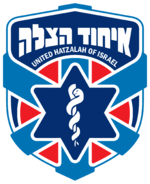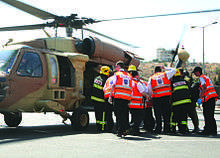United Hatzalah
 | |
| Formation | 2006 |
|---|---|
| Type | free, volunteer-based emergency medical services |
| Legal status | Non-governmental organization, Non-profit organization |
| Focus | Humanitarian |
| Headquarters | Jerusalem, Israel |
Area served | Israel, Worldwide |
Official language | Hebrew |
President/Founder | Eli Beer |
Budget | US$12 million (2016) |
Volunteers | 2500 |
| Website | israelrescue.org |
| Remarks | Awarded 2011 Israeli Presidential Award for Volunteerism |
United Hatzalah ("united rescue" in Hebrew: איחוד הצלה) is a free, volunteer-based emergency medical services (EMS) organization based in Jerusalem. It is one of many Hatzalah organizations in various parts of the world. Founded in 2006, it is the largest independent, non-profit and fully volunteer EMS organization in Israel, with more than 2,500 emergency medical technicians (EMT), certified first responders, paramedics and doctors dispersed throughout the country. From its LifeCompass Command Center, United Hatzalah uses advanced GPS-based dispatch technology to identify the closest and most qualified volunteers to the scene of an emergency and routes those individuals through a mobile device application. Cadres of trained civilian volunteers throughout Israel create a web of emergency first responders, each outfitted with medically equipped motorcycles (“ambucycles”) capable of reaching victims in as few as 90 seconds.[1] The organization is funded exclusively through private charitable support.
Within Israel, individuals may contact United Hatzalah through its direct emergency number, 1221; however, most dispatch information is received directly from national ambulance services. United Hatzalah in turn alerts and coordinates with local ambulance, Search and Rescue (SAR), fire, and police services, when necessary.

Mission
United Hatzalah’s mission is to provide immediate lifesaving medical assistance during the critical window between the onset of an emergency and the arrival of traditional ambulance assistance. Services are provided free of charge without regard to race, religion, or ethnic background. As a designated national security asset by the Israel Defense Forces (IDF) Home Front Command, United Hatzalah’s LifeCompass Command Center operates 24 hours a day, seven days a week, 365 days a year. Their ultimate goal is to reduce response time from a previous national average of 20 minutes down to 90 seconds, which is within the critical lifesaving window.
History
As a young EMT in Jerusalem, Eli Beer recognized that heavy urban traffic and narrow streets often prevented ambulances from arriving in time to save a victim. In response, he organized a volunteer unit of EMTs within his Jerusalem neighborhood. After the Second Lebanon War (Hebrew: מלחמת לבנון השנייה, Milhemet Levanon HaShniya) in 2006, Beer brought together more than 50 separate Hatzalah chapters to form United Hatzalah of Israel. Initially, volunteers responded to less than 200 calls per day by monitoring two-way emergency radio scanners. As cellular technology evolved, volunteers migrated to a managed push-to-talk network, which enabled two-way communications between dispatchers and volunteer medics.
Later, United Hatzalah standardized ambucycles—motorcycles retrofitted with a storage box mounted to the back of the vehicles—each of which contains a complete trauma kit, an oxygen canister, a blood sugar monitor, and an automated external defibrillator. These ambucycles contain all of the lifesaving equipment commonly found in an ambulance but on a vehicle nimble enough to weave through traffic, narrow alleys, or obstructed roadways.
United Hatzalah then partnered with NowForce to create a proprietary mobile dispatch application to receive calls, assess the unique capabilities, mobility and equipment of the closest volunteers, and then route the most appropriate medics to a given emergency. Today, all volunteers receive alerts on their mobile phone through the NowForce command-and-control application [2].
Results and Demographics
United Hatzalah currently responds to approximately 800 calls per day and as many as 1,200 calls during large-scale emergencies such as the 2014 Israel–Gaza Conflict. In 2014, the organization answered more than 245,000 calls, with a volunteer corps of 2,500 medics, and a fleet of 440 ambucycles. Of the 2,500+ volunteer medics, 38% are Haredi, 33.7% Modern Orthodox, 23.6% Secular, 3.1% Muslim, 1.1% Druze and .2% Christian, and .3% other.
United Hatzalah’s lifesaving model has reduced average response time to three minutes; the average response time across Israel, however, remains between 10 and 12 minutes. On sudden cardiac arrest calls—the best measure of emergency medical performance—United Hatzalah’s success in reducing response times and increasing quality of care have changed in lock step with national survival rates: In the 10 years since United Hatzalah’s inception, the rate of cardiac-arrest deaths has decreased by 50%, according to the Israel Heart Society. At 46.4 deaths per 100,000 people, the World Health Organization reports that Israel ranks 12th best out of 192 countries in terms of coronary-related mortality.[3]
SOS Mobile Application
Following the high-profile abduction and murder of three Israeli youths in June 2014, United Hatzalah responded with SOS, a one-swipe emergency alert application. Downloaded by more than 150,000 people, SOS sends a distress signal to United Hatzalah’s 24/7 dispatch center, while also transmitting the user’s GPS coordinates to law enforcement officials—a process that may otherwise require days of legal maneuvering. SOS is meant to function as an emergency safety and security alert system, complementing direct verbal communication with police, fire, or medical emergency dispatchers. The app was developed in conjunction with NowForce and may be downloaded for free at sos.nowforce.com in both English and Hebrew.
Awards and Recognition
In April 2013, Eli Beer presented a TedMed talk titled, “The fastest ambulance? A motorcycle,” in which he describes the circumstances that led to him to re-imagine first-response medicine by training volunteer EMTs to respond to local emergencies and stabilize victims until official help arrives.[4] The video has been viewed more than 990,000 times to date .
During the March 2015 American-Israel Public Affairs Committee (AIPAC) Policy Conference—the largest yearly gathering of the pro-Israel movement in the United States—United Hatzalah was honored as a featured innovator. AIPAC’s Innovation Showcase was presented before 16,000 attendees and serves to highlight emerging technology developed in Israel but with worldwide impact.
In recognition of its dedication to save lives, Eli Beer, on behalf of United Hatzalah, has received numerous international accolades, including the Israeli Presidential Award for Volunteerism in 2011 and the Institute of International Education’s Victor J. Goldberg Prize in 2013. In 2015, United Hatzalah received the OMETZ Award for its operational professionalism and transparent management. Eli Beer was personally recognized the Schwab Foundation for Social Entrepreneurship in cooperation with the World Economic Forum (WEF) as a Social Entrepreneur in 2010. WEF subsequently named him a Young Global Leader in 2012 for his efforts to create a multicultural, apolitical medical rescue organization.
See also
References
- ↑ "Just an ambucycle ride away". The Jerusalem Post. Retrieved 30 March 2015.
- ↑ "Gov't dithers in red tape, defibrillator saves life". The Jerusalem Post. Retrieved 25 March 2015.
- ↑ "Global Atlas on cardiovascular disease prevention and control" (PDF). World Health Organization. Retrieved 1 April 2015.
- ↑ "The Fastest Ambulance? A Motorcycle". TedMed. Retrieved 25 March 2015.
External links
- Official Page
- "Haredi, Arab saving lives together"
- Israel's fast, free and innovative way to save lives
- Forbes India, How An Israeli Organisation Could Help Accident Victims In India
- The Economist, Saving lives - Scattered saviours
- Eli Beer presents at TEDMED